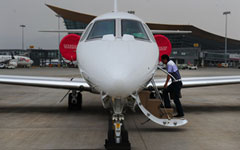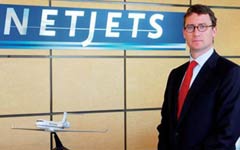Gulfstream Aerospace Corp, a business-jet manufacturer based in Georgia that has a 65 percent market share of the private-jet market in China, has seen its fleet in China grow fourfold over the last five years.
It delivered its first aircraft to China in 2003 and has more than 130 planes at mainland, Hong Kong, Macao and Taiwan today.
Gulfstream announced in April that it had signed an order for 60 aircraft with the Minsheng Financial Leasing Co, one of the largest in Gulfstream history.
 |
|
 |
Steve Cass, spokesperson for Gulfstream, said: "I think what people are beginning to realize is that they really are becoming business tools that allow them to be more productive.
"The world economy is a global economy, so the need to travel all around the world where your business is expanded, it's imperative."
The Chinese government has taken steps to loosen control on airspace, announcing in November last year that it would simplify flight-approval procedures for general aviation aircraft, which are often business-related planes.
To file a flight plan, which is required for flying a business aircraft, an individual had to apply days ahead, which negates the value of flying a business jet, NBAA's Hubbard says.
"Business aviation is an asset to a company largely because you can decide on a moment's notice to go somewhere to pursue an opportunity or to get in front of a customer, or to conduct a meeting or visit a branch office for managerial reasons," Hubbard says.
"You can do all of that in the United States and in many countries on a last minute, spur-of-the-moment basis, whereas in China you really couldn't. So that drains the asset of a lot of its value."
China has indicated in its 12th Five-Year Plan (2011-15) that it will begin implementing policies to make its aviation system more flexible.
"They're interested in it in deed and not just in word," Hubbard says.
"When we host delegations from China, what the Chinese want to know is, 'What should we be looking at? What can we do to try to foster this so that we have an asset in China that you clearly have and benefit from in the US?'"
